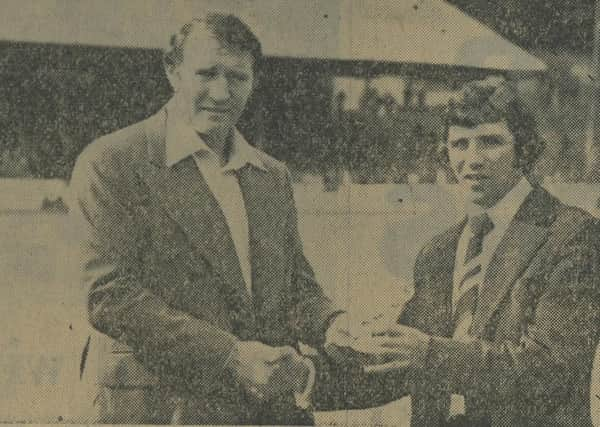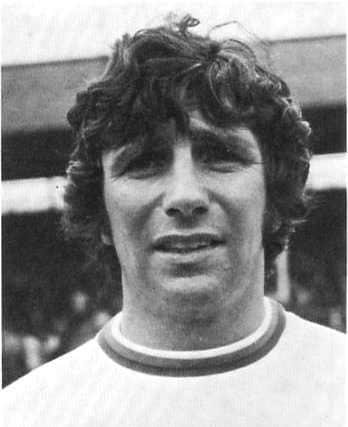Former Halifax Town player-manager Johnny Quinn dies aged 82


He will be remembered fondly by Halifax Town supporters who voted him Player of the Year, and after he had taken over as manager, took a long time to forgive the board following Quinn’s sacking – and the manner of it – in February 1976.
When they first appointed Quinn the board was mindful of his necessary leadership qualities and that he commanded the respect of his peers after a career which had seen him play top flight football with Sheffield Wednesday.
Advertisement
Hide AdAdvertisement
Hide AdHe had been spotted playing for Prescot Cables in the St Helens Combination League and signed for the Owls upon leaving school in May 1959.


Quinn made his debut on the right-wing in a 2-0 win over Luton Town on 26 September 1959 and figured in a variety of positions as Sheffield Wednesday finished First Division runners-up to the great Tottenham Hotspur side which clinched the double in 1960-61.
Two years’ National Service spent as a PTI with the 11th Signal Regiment at Catterick limited Quinn’s first team opportunities but by the 1964-65 season he had established himself as a half-back and the following term he was a valuable member of the Wednesday side which reached the FA Cup Final, only to lose 3-2 to Everton having been two goals up.
He went on to make 173 League appearances and score twenty goals for the Owls before leaving in November 1967 for Second Division strugglers Rotherham United, where he was made skipper by manager Tommy Docherty.
Advertisement
Hide AdAdvertisement
Hide AdUnable to prevent the Millers’ relegation that term, Quinn nevertheless became an important member of the side, famed in song by the supporters who viewed him as the original ‘Mighty Quinn’, a title they took from the hit of the same name by Manfred Mann in 1968. He went on to give the club five years’ great service, racking up 114 League appearances and adding a further seven goals before being released by manager Jim McAnearney.
In July 1972, Quinn then became new Halifax Town boss George Mulhall’s first signing and was made captain here, too. The Shaymen made a promising start to the season, though it was more than coincidence that they began to struggle once Quinn was injured and out of the side.
He returned to help the cause towards the end of the campaign, scoring the crucial second goal in victory over Bournemouth – it was his only goal for the club – in the penultimate match as Town won their last four games to avoid relegation from the Third Division on goal average.
In 1973-74 Quinn missed just one match as Town finished ninth, with the supporters appreciating his contribution by voting him their Player of the Year. As he went into the new season, management must have been the furthest thing from his mind but when Mulhall suddenly resigned in September 1974, Quinn was asked to take over in a caretaker capacity, and though his first game ended in defeat at Blackburn Rovers, he was offered the post on a full-time basis.
Advertisement
Hide AdAdvertisement
Hide AdQuinn’s reaction was typical humble: “I am prepared to take the job but if I feel it is too much for me after the next fortnight then I will let [the board] know.”
Quinn pledged himself to the cause but immediately came across the problems unique to smaller clubs such as Halifax Town when he found himself with only 12 fit players, two of which were goalkeepers, and with the Football League turning down his plea to postpone a match at Peterborough, Quinn pressed Barry White into what was the first of four outfield appearances.
He would feel the heat with FA Cup defeat at non-league Stafford Rangers just two months into his reign, but by standing down as a player in February 1975 – he had 92 League appearances for the Shaymen to his name – to concentrate on team affairs, he steadied the ship and lifted them away from the relegation zone.
Quinn went into the 1975-76 season with the ringing endorsement by chairman Percy Albon that he was “as good a manager as we have had in a long time,”
Advertisement
Hide AdAdvertisement
Hide AdIndeed, the Shaymen made a promising start to the 1975-76 season but the rot set in and Town slid alarmingly down the table to find themselves in 18th place following defeat by Shrewsbury Town on 24 January 1976.
With 21 games still to play, Quinn may have had enough time to turn things around, but the board weren’t for giving him the opportunity. Feeling they had to act, Alan Ball Snr, who had delivered Halifax Town’s first promotion in 1969, was already being lined up to replace him, with the national press being privy to the story before Quinn was officially told.
Upon his dismissal, the Halifax Courier led with the headline ‘They couldn’t have sacked a nicer guy’, and there was an angry backlash by the supporters who were resentful of the way the board had seemingly gone behind his back.
After leaving The Shay, Quinn took over as player-manager at Worksop Town, his last club. At the same time he opened a sports shop with former Wednesday colleague Gerry Young just a stone’s throw from the Hillsborough ground and formed ‘Johnny Quinn’s All Stars’, a charity football team featuring former professionals from the South Yorkshire area, which he ran for many years until May 2006.
Described as a gentleman by all who knew him, Johnny Quinn was one of the game’s good guys and the footballing world will be saddened at his loss.
Comment Guidelines
National World encourages reader discussion on our stories. User feedback, insights and back-and-forth exchanges add a rich layer of context to reporting. Please review our Community Guidelines before commenting.